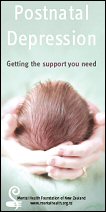Women are more likely to develop emotional problems after childbirth than at any other time in their lives and the life time prevalence of major depression in women is almost twice that of men (Kohen, 2001). According to Lumley et al. (2004), one out of every six women experiences a depressive illness in the first year after giving birth. Thirty per cent of those women will still be depressed when their child is two years old. Of those women, 94% report experiencing a related health problem. Women who experience problems in the early stages of motherhood also report problems with their relationships, their own physical health and well-being. Women report that a lack of support, isolation, and exhaustion are common experiences.
Several years ago I was approached to develop a new brochure about Women’s perinatal mental health (given my expertise as as a clinician and educator in maternal mental health) for the New Zealand Mental Health Foundation who were partnering with EGG maternity a New Zealand company specialising in maternity wear. In developing the brochure, my partner and I consulted widely with consumer groups, mothers, fathers, health professionals in order to ascertain what would be the most important and clear information we could put inside the brochure. This was the end result:
The PND brochure has become widely available, it is included in information packs given to new mothers by Plunket, available from the resource centre at the Mental Health Foundation, the Foundation website and EGG maternity boutiques in New Zealand. It has been one of the most requested brochures ever with 33,800 sent out in 2011 alone.
Women who have a baby in a new country and are separated from their support networks and special perinatal customs (including special foods, nurturing, rest and household help) through migration can experience isolation and postnatal depression.
For the Year of the Dragon this brochure has been translated into Chinese by Kai Xin Xing Dong -a public education programme aimed at reducing the stigma and discrimination faced by Chinese people who experience mental illness. Funded by the Ministry of Health, the project aims to raise mental health awareness in the Chinese community and to counter stigma and discrimination.
See here for other PND resources


